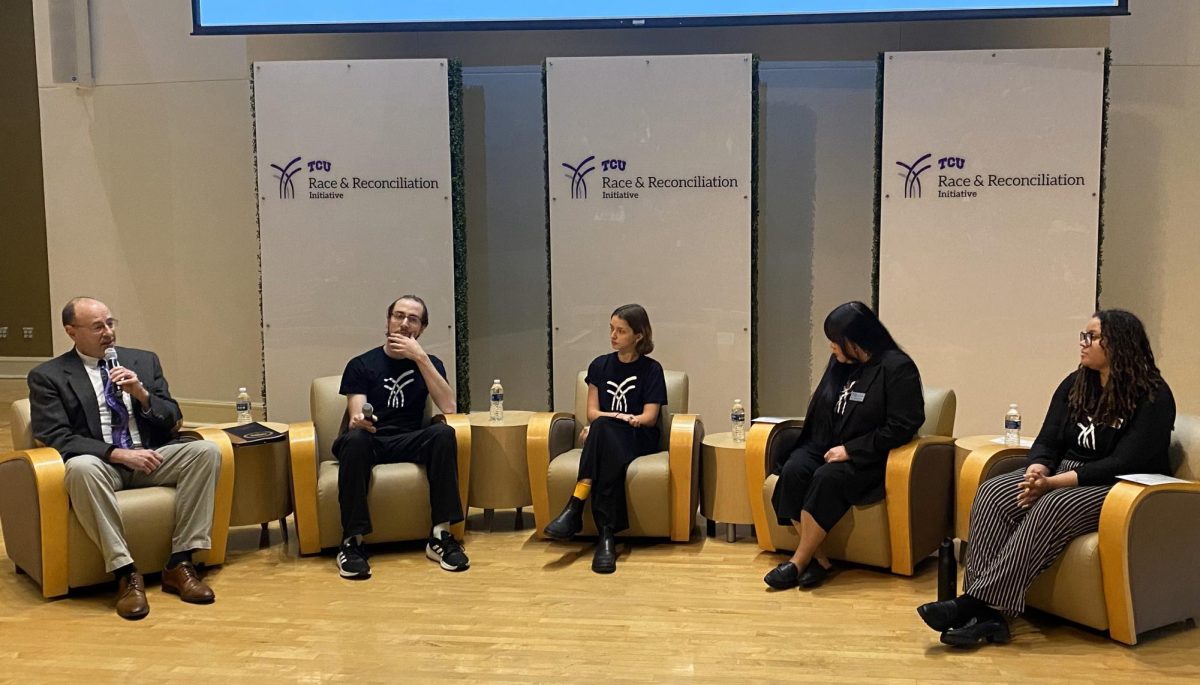Three different professors will offer their opinions about the war in Iraq and whether it is justified during the second Searchlight Symposium on Thursday in the Kelly Alumni Center, said the host of the symposium.The symposium, sponsored by Programming Council, is titled ‘What is a Just War? Are We in One?,’ said John Wood, a junior English major and symposium host.
Wood said the Searchlight Symposium was first conducted last semester and questioned, ‘What does it mean to be an ethical leader?’ Wood said the symposiums will now occur at the end of each semester with a panel of professors from various departments addressing a title question each time.
“The question is always a topic of significant cultural relevance,” Wood said. “Professors will shine light on the topic; hence the name ‘searchlight’.”
In each symposium, professors speak on the question at hand for 20 minutes and then the forum is opened to a Q&A session with students.
“The idea was a collaboration between myself and the Provost,” Wood said. “Each semester’s theme is something I come up with after considering what might be the most important and interesting issue at the time.”
Guest speakers of the symposium will include the history department’s Lyndon Baines Johnson Chair Mark Gilderhus, religion associate professor Nadia Lahutsky and political science assistant professor Eric Cox, Wood said. He said he will also conclude with some of his own personal beliefs about the topic.
“The symposium should illuminate what exactly a just war is,” Wood said. “It is a wonderful theory but terribly difficult to apply.”
Wood said these professors were chosen because of their expertise and teaching backgrounds.
“Religion, political science and history seemed like relevant departments to turn to for answers,” Wood said, “and these three professors were the most qualified to speak on the issue.”
Gilderhus, who teaches courses such as Special Topics in Church History and U.S. Military History, said he thinks the symposium will be interesting and surprising because no speaker knows what the others will say.
Lahutsky said she prefers to present her views without argument.
“I don’t want to get into a huge debate,” Lahutsky said.
Lahutsky, who teaches Contemporary Catholicism, declined to fully reveal her views because she said she wants to present them at the symposium. However, she said she will compare the views of Catholicism to the current war.
Lahutsky said she thinks it is very difficult to meet conditions that would justify a war.
“I haven’t heard anyone refer to this as a just war,” Lahutsky said.
Gilderhus said he will speak on how he feels the war in Iraq is not justified by President Bush.
“I suppose the term ‘war criminal’ is too harsh to describe the president,” Gilderhus said, “but it comes close.”
Gilderhus said he feels the war is not just because he thinks Bush failed to meet crucial criteria.
“The war is the biggest strategic disaster in all of American history,” Gilderhus said.
Cox said he also feels that invading Iraq was not a legitimate action. Cox, who teaches courses such as Civic Literacy and International Politics, said he thinks the invasion violated the United Nations Charter, the current law governing the United States’ use of force in war by only allowing action in self-defense unless otherwise approved.
Though he said the war was illegal, Cox said he also thinks it has done some good.
“Bush started an important conversation about the way international law needs to go,” Cox said.
Wood said the last semester was the first time the Searchlight Symposium was conducted, when the theme was ‘What does it mean to be an ethical leader?’.
Wood said the symposiums will now occur at the end of each semester with a panel of professors from various departments addressing a title question.
“The question is always a topic of significant cultural relevance,” Wood said. “Professors will shine light on the topic; hence the name, searchlight.”
Wood said Programming Council sponsors the symposium but is only involved with the publicity and logistics.
“The Programming Council is not involved with the content of the symposium,” Wood said.
Wood said the symposium was derived from an idea he had his sophomore year and was created, organized and hosted by himself.
“The idea was originally to have professors present their personal research,” Wood said, “but I thought it more interesting to hear them answer important questions that the TCU community might have.




